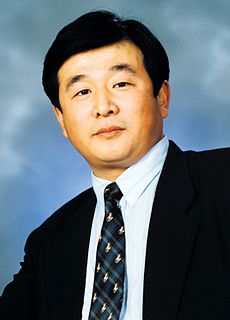A Quote by Ilchi Lee
We live with many thoughts, emotions, and habits, but at the same time we have other eyes, another mind capable of watching all of these things. Those who practice self-cultivation find that mind; they live with it and they die with it.
Related Quotes
In the egoic state, your sense of self, your identity, is derived from your thinking mind - in other words, what your mind tells you about yourself: the storyline of you, the memories, the expectations, all the thoughts that go through your head continuously and the emotions that reflect those thoughts. All those things make up your sense of self.
Concentration is not thinking of one thing. On the contrary, it is excluding all thoughts, since all thoughts obstruct the sense of one's true being. All efforts are to be directed simply to removing the veil of ignorance. Concentrating the mind solely on the Self will lead to happiness or bliss. Drawing in the thoughts, restraining them and preventing them from straying outwards is called detachment (vairagya). Fixing them in the Self is spiritual practice (sadhana). Concentrating on the heart is the same as concentrating on the Self. Heart is another name for Self.
If something controls you in a way that puzzles you, think of it as a mystery. Mysteries are best approached by closing your eyes and mouth to experience darkness and silence. I find new and healing images in that dark, silent place away from emotions that control me. Do not be afraid to close your eyes and be silent in prayer, meditation, rest or sleep. In those states you may rediscover a new self. Then your life, time and thoughts will become yours again and you can live your unique myth.
The practice of Zen mind is beginner's mind. The innocence of the first inquiry—what am I?—is needed throughout Zen practice. The mind of the beginner is empty, free of the habits of the expert, ready to accept, to doubt, and open to all the possibilities. It is the kind of mind which can see things as they are, which step by step and in a flash can realize the original nature of everything.
There are three motives for which we live; we live for the body, we live for the mind, we live for the soul. No one of these is better or holier than the other; all are alike desirable, and no one of the three—body, mind, or soul—can live fully if either of the others is cut short of full life and expression.
In the beginner's mind there are many possibilities; in the expert's mind there are few.... In the beginner's mind there is no thought, 'I have attained something.' All self-centered thoughts limit our vast mind. When we have no thought of achievement, no thought of self, we are true beginners. We can really learn something.
I am burdened with what the Buddhists call the monkey mind. The thoughts that swing from limb to limb, stopping only to scratch themselves, spit and howl. My mind swings wildly through time, touching on dozens of ideas a minute, unharnessed and undisciplined. You are, after all, what you think. Your emotions are the slaves to your thoughts, and you are the slave to your emotions.
Positive and negative emotions cannot occupy the mind at the same time. One or the other must dominate. It is your responsibility to make sure that positive emotions constitute the dominating influence of your mind. Here the law of HABIT will come to your aid. Form the habit of applying and using the positive emotions! Eventually, they will dominate your mind so completely, that the negatives cannot enter it.
































